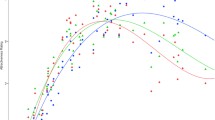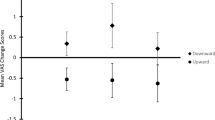Abstract
Research suggests that television reflects the negative cultural stereotypes of women and heavyweight people. The purpose of this study was to analyze the extent to which paid programming reflects the gender role expectations that have been observed in other kinds of programming and, in particular, the gender representations and weight-stereotypic messages in weight loss infomercials. The results show that images of women outnumbered those of men 2:1, thin women appeared 3 times as frequently as heavyweight women, and the “scientific expert” was always a man. Weight loss infomercials contained more references to unrestricted than to restricted eating, promoted weight loss without exercise more than with exercise, and portrayed heavyweight people as unhappy and unattractive. The implications of the findings for weight-related prejudice and stigma are discussed.
Similar content being viewed by others
REFERENCES
Allon, N. (1979). Self-perceptions of the stigma of overweight in relationship to weight losing patterns. American Journal of Clinical Nutrition, 32, 470-480.
Allon, N. (1982). The stigma of overweight in everyday life. In B. B. Wortman (Ed.), Psychological aspects of obesity (pp. 130-174). New York: Van Nostrand Reinhold.
Beckwith, J. (1994). Terminology and social relevance in psychological research on gender. Social Behavior and Personality, 22, 329-336.
Blaine, B., DiBlasi, D., & Connor, J. (in press). The effect of weight loss on perceptions of weight controllability: Implications for prejudice against fat people. Journal of Applied Biobehavioral Research.
Blaine, B., & Williams, Z. (2002). Does the belief in the uncontrollability of weight reduce heavyweight stigma in adult women? Manuscript under review.
Bryant, J., & Zillman, D. (2002). Media effects: Advances in theory and research. Mahwah, NJ: Erlbaum.
Cameron, J. (1999). Self-esteem changes in children enrolled in weight management program. Issues in Comprehensive Pediatric Nursing, 22, 75-85.
Cogan, J., & Rothblum, E. (1993). Outcomes of weight-loss programs. Genetic, Social, and General Psychology Monographs, 118, 385-415.
Coltrane, S., & Adams, M. (1997). Work-family imagery and gender stereotypes: Television and the reproduction of difference. Journal of Vocational Behavior, 50, 323-347.
Courtney, A., & Whipple, T. (1980). Sex stereotyping in advertising. Lexington, MA: Lexington Books.
Crandall, C. (1994). Prejudice against fat people: Ideology and self-interest. Journal of Personality and Social Psychology, 66, 882-894.
Crandall, C., & Biernat, M. (1990). The ideology of anti-fat attitudes. Journal of Applied Social Psychology, 20, 227-243.
Crandall, C., & Martinez, R. (1996). Culture, ideology, and antifat attitudes. Personality and Social Psychology Bulletin, 22, 1165-1176.
Donthu, N., & Gilliland, D. (1996). Observations: The infomercial shopper. Journal of Advertising Research, 36, 69-76.
Ernsberger, P., & Koletsky, R. (1999). Biomeidical rationale for a wellness approach to obesity: An alternative to a focus on weight loss. Journal of Social Issues, 55, 221-259.
Food and Drug Administration. (1997, September 15). FDA announces withdrawal of fenfluramine and dexfenfluramine. (News Release).
Fouts, G., & Burggraf, K. (1999). Television situation comedies: Female body images and verbal reinforcements. Sex Roles, 40, 473-481.
Fouts, G., & Burggraf, K. (2000). Television situation comedies: Female weight, male negative comments, and audience reactions. Sex Roles, 42, 925-932.
Fraser, L. (1998). Losing it: False hopes and fat profits in the diet industry. New York: Penguin.
Gilly, M. (1988). Sex roles in advertising: Acomparison of television advertisements in Australia, Mexico, and the United States. Journal of Marketing, 52, 75-85.
Hall, C., & Crum, M. (1994). Women and bodyisms in ality characterization. Journal of Psychology, 108, 233-240.
Lavine, H., Sweeney, D., & Wagner, S. (1999). Depicting women as sex objects in television advertising: Effects on body dissatisfaction. Personality and Social Psychology Bulletin, 25, 1049-1058.
Levy, A., & Heaton, A. (1993). Weight control practices of U.S. adults trying to lose weight. Annals of Internal Medicine, 119, 661-666.
Lovdal, L. (1989). Sex role messages in television commercials: An update. Sex Roles, 21, 715-724.
Malkin, A., Wornian, K., & Chrisler, J. C. (1999). Women and weight: Gendered messages on magazine covers. Sex Roles, 40, 647-655.
National Center for Healthcare Statistics. (1999). National Health and Nutrition Examination Survey. Retrieved from http://www.cdc.gov/nchs/nhanes.htm
Silverstein, B., Perdue, L., Peterson, B., & Kelly, E. (1986). The role of the mass media in promoting a think standard of bodily attractiveness for women. Sex Roles, 14, 519-532.
Weiner, B., Perry, R., & Magnusson, J. (1988). Anattributional analysis of reactions to stigmas. Journal of Personality and Social Psychology, 55, 738-748.
Author information
Authors and Affiliations
Rights and permissions
About this article
Cite this article
Blaine, B., McElroy, J. Selling Stereotypes: Weight Loss Infomercials, Sexism, and Weightism. Sex Roles 46, 351–357 (2002). https://doi.org/10.1023/A:1020284731543
Issue Date:
DOI: https://doi.org/10.1023/A:1020284731543




